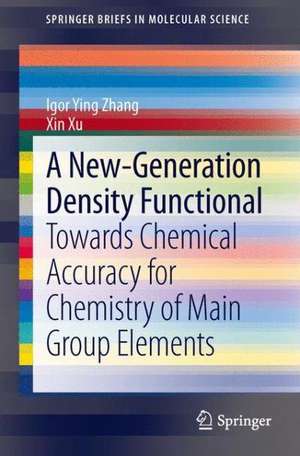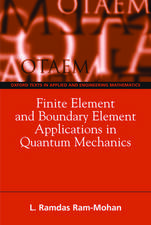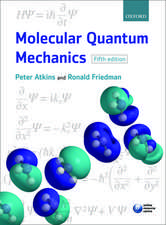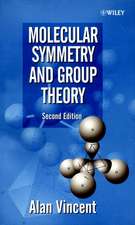A New-Generation Density Functional: Towards Chemical Accuracy for Chemistry of Main Group Elements: SpringerBriefs in Molecular Science
Autor Igor Ying Zhang, Xin Xuen Limba Engleză Paperback – 4 dec 2013
Din seria SpringerBriefs in Molecular Science
-
 Preț: 411.46 lei
Preț: 411.46 lei -
 Preț: 379.09 lei
Preț: 379.09 lei -
 Preț: 356.49 lei
Preț: 356.49 lei -
 Preț: 441.25 lei
Preț: 441.25 lei -
 Preț: 389.70 lei
Preț: 389.70 lei -
 Preț: 376.22 lei
Preț: 376.22 lei -
 Preț: 348.77 lei
Preț: 348.77 lei -
 Preț: 345.14 lei
Preț: 345.14 lei -
 Preț: 347.68 lei
Preț: 347.68 lei -
 Preț: 346.70 lei
Preț: 346.70 lei -
 Preț: 376.43 lei
Preț: 376.43 lei -
 Preț: 342.14 lei
Preț: 342.14 lei -
 Preț: 375.23 lei
Preț: 375.23 lei -
 Preț: 375.23 lei
Preț: 375.23 lei -
 Preț: 379.09 lei
Preț: 379.09 lei -
 Preț: 376.59 lei
Preț: 376.59 lei - 15%
 Preț: 461.73 lei
Preț: 461.73 lei -
 Preț: 376.59 lei
Preț: 376.59 lei -
 Preț: 376.59 lei
Preț: 376.59 lei -
 Preț: 375.23 lei
Preț: 375.23 lei -
 Preț: 351.18 lei
Preț: 351.18 lei -
 Preț: 377.73 lei
Preț: 377.73 lei -
 Preț: 372.73 lei
Preț: 372.73 lei -
 Preț: 378.54 lei
Preț: 378.54 lei -
 Preț: 376.96 lei
Preț: 376.96 lei -
 Preț: 377.35 lei
Preț: 377.35 lei -
 Preț: 378.12 lei
Preț: 378.12 lei -
 Preț: 376.04 lei
Preț: 376.04 lei -
 Preț: 346.59 lei
Preț: 346.59 lei -
 Preț: 375.45 lei
Preț: 375.45 lei -
 Preț: 377.73 lei
Preț: 377.73 lei -
 Preț: 381.00 lei
Preț: 381.00 lei -
 Preț: 377.18 lei
Preț: 377.18 lei -
 Preț: 376.96 lei
Preț: 376.96 lei -
 Preț: 380.07 lei
Preț: 380.07 lei -
 Preț: 376.22 lei
Preț: 376.22 lei -
 Preț: 343.72 lei
Preț: 343.72 lei -
 Preț: 376.22 lei
Preț: 376.22 lei -
 Preț: 377.35 lei
Preț: 377.35 lei -
 Preț: 343.72 lei
Preț: 343.72 lei -
 Preț: 376.22 lei
Preț: 376.22 lei -
 Preț: 375.07 lei
Preț: 375.07 lei -
 Preț: 374.85 lei
Preț: 374.85 lei - 15%
 Preț: 464.97 lei
Preț: 464.97 lei -
 Preț: 376.43 lei
Preț: 376.43 lei -
 Preț: 341.75 lei
Preț: 341.75 lei -
 Preț: 374.30 lei
Preț: 374.30 lei -
 Preț: 375.23 lei
Preț: 375.23 lei -
 Preț: 377.57 lei
Preț: 377.57 lei
Preț: 378.12 lei
Nou
Puncte Express: 567
Preț estimativ în valută:
72.35€ • 75.54$ • 59.88£
72.35€ • 75.54$ • 59.88£
Carte tipărită la comandă
Livrare economică 04-18 aprilie
Preluare comenzi: 021 569.72.76
Specificații
ISBN-13: 9783642404207
ISBN-10: 3642404200
Pagini: 120
Ilustrații: IX, 110 p. 31 illus., 15 illus. in color.
Dimensiuni: 155 x 235 x 6 mm
Greutate: 0.18 kg
Ediția:2014
Editura: Springer Berlin, Heidelberg
Colecția Springer
Seria SpringerBriefs in Molecular Science
Locul publicării:Berlin, Heidelberg, Germany
ISBN-10: 3642404200
Pagini: 120
Ilustrații: IX, 110 p. 31 illus., 15 illus. in color.
Dimensiuni: 155 x 235 x 6 mm
Greutate: 0.18 kg
Ediția:2014
Editura: Springer Berlin, Heidelberg
Colecția Springer
Seria SpringerBriefs in Molecular Science
Locul publicării:Berlin, Heidelberg, Germany
Public țintă
ResearchCuprins
An overview of modern density functional theory (DFT).- A new generation of doubly hybrid density functionals (DHDFs).- Benchmarking the performance of DHDFs for the main group chemistry.- XYG3 results for some selected applications.- Concluding remarks.
Notă biografică
Dr. Igor Ying Zhang received his B.Sc. in Chemistry from Xiamen University, China in 2003. He later received his D.Sc. in Chemistry at the same university in 2010 and completed his Ph. D. in Chemistry at the Royal Institute of Technology (KTH), Sweden in 2011, where he was an exchange student. From 2011 to 2012, he was a research assistant at Fudan University, China. In May 2012, he became a postdoctoral researcher at the Max Planck Society’s Fritz Haber Institute in Berlin, Germany. He was a principle investigator for development of the XYG3 density functional.
Prof. Xin Xu received his D. Sc. in Chemistry from Xiamen University in 1991. After a postdoctoral stay at Fujian Institute of Research on the Structure of Matter, Academia Sinica, he was appointed as an associated professor in 1993 and was promoted to a full professor in 1995 at the Department of Chemistry, Xiamen University. He was also affiliated to the State Key Lab of Physical Chemistry on Solid Surfaces (PCOSS), China, where he acted as deputy director from 1996 to 2003. He was appointed the Lu-Jia-Xi Chair Professor of Xiamen University in 2006. From 2010, he has served at Fudan University as a Chair Professor and was elected as the Chang-Jiang professor in 2012. He has been a visiting professor at Kyoto University, Japan; California Institute of Technology, USA; Université de Lyon, CNRS, and Ecole Normale Supérieure of Lyon, France; etc. His research interests involve the development of density functionals and linear scaling quantum chemical methods, as well as the modeling of reaction mechanisms on the solid surfaces and in solutions.
Prof. Xin Xu received his D. Sc. in Chemistry from Xiamen University in 1991. After a postdoctoral stay at Fujian Institute of Research on the Structure of Matter, Academia Sinica, he was appointed as an associated professor in 1993 and was promoted to a full professor in 1995 at the Department of Chemistry, Xiamen University. He was also affiliated to the State Key Lab of Physical Chemistry on Solid Surfaces (PCOSS), China, where he acted as deputy director from 1996 to 2003. He was appointed the Lu-Jia-Xi Chair Professor of Xiamen University in 2006. From 2010, he has served at Fudan University as a Chair Professor and was elected as the Chang-Jiang professor in 2012. He has been a visiting professor at Kyoto University, Japan; California Institute of Technology, USA; Université de Lyon, CNRS, and Ecole Normale Supérieure of Lyon, France; etc. His research interests involve the development of density functionals and linear scaling quantum chemical methods, as well as the modeling of reaction mechanisms on the solid surfaces and in solutions.
Textul de pe ultima copertă
A New-Generation Density Functional: Towards Chemical Accuracy for Chemistry of Main Group Elements covers the most recent progress in the development of a new generation of density functional theory (DFT) for accurate descriptions of thermochemistry, thermochemical kinetics, and nonbonded interactions of main group molecules. In this book, the authors present the doubly hybrid density functionals (DHDFs), which dramatically improve the accuracy for predictions of critical properties by including the role of the virtual (unoccupied) orbitals. The authors not only discuss the theoretical bases of three classes of DHDFs but also demonstrate their performance using some well-established benchmarking data sets.
Caracteristici
Summarizes some of the latest advances in the development of density functional approximations Discusses the theoretical bases of the doubly hybrid density functionals (DHDFs) Demonstrates their functional performance using some well-established benchmarking data sets Highlights some fundamental issues in the ground state Kohn-Sham DFT











